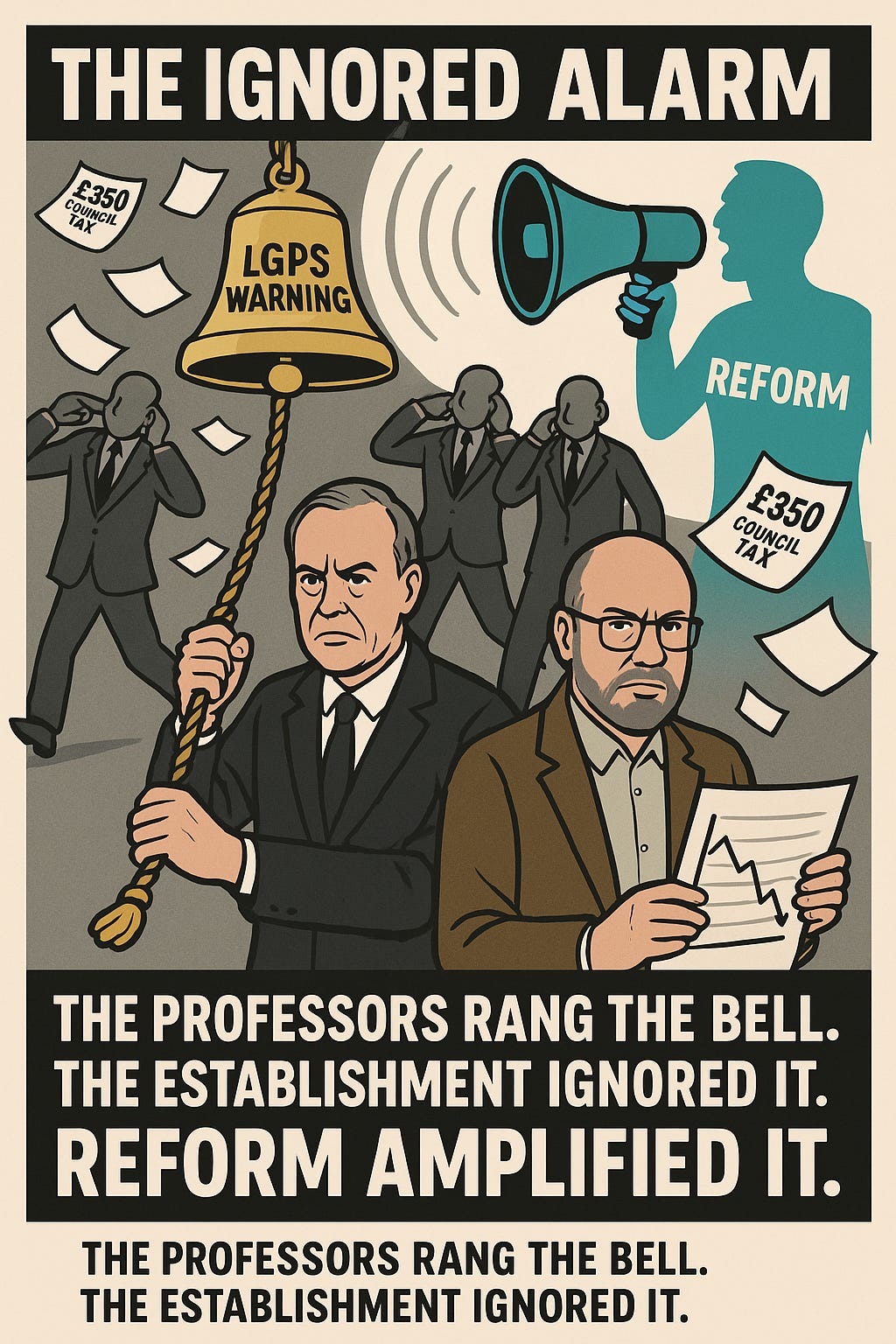The Malaise of Modern Politics: Why Only Reform UK Listened to Clancy and Bailey
Labour, the Conservatives, and the Liberal Democrats all had opportunities to confront the problem. None did.
British politics today suffers from a strange lethargy. Parliament buzzes with soundbites and carefully staged rows, yet when serious warnings are raised about billions of pounds of public money being wasted, the main parties fall silent. Into that silence has stepped Reform UK — the only party to take seriously the long-standing concerns of Professors Clancy and Bailey about the Local Government Pension Scheme (LGPS). The irony is that Clancy and Bailey are far from Reform supporters: Bailey is an international economist specialising in the automotive industry, Clancy a former leader of Birmingham City Council. Neither are populists, nor aligned with Richard Tice’s party. And yet, in the barren landscape of British politics, it is Reform alone that has picked up their analysis and run with it
.
Clancy and Bailey are serious, evidence-driven figures. Bailey is respected well beyond Britain’s shores for his economic work. Clancy’s time leading Birmingham City Council was brief — just two years — and some, myself included, believe his insistence on scrutinising pension funds contributed to his downfall. Neither man is given to grandstanding. But when they warned that billions were being wasted through excessive management fees, poor investment returns, and questionable allocations, the political mainstream looked away.
Warnings Unheeded
Labour, the Conservatives, and the Liberal Democrats all had opportunities to confront the problem. None did. Instead, they relied on civil service briefings describing the scheme as “sound” and “well-managed.” Reform UK, by contrast, broke ranks. Richard Tice branded the LGPS a “gravy train culture,” promised to sack underperforming fund managers, and went further still — arguing that households could save up to £350 a year on council tax if the waste were stopped.
Here lies the striking irony: Clancy and Bailey’s sober academic critiques have been ignored for years by mainstream parties, only to be weaponised by a party they themselves would not naturally support. Reform has turned their overlooked research into a populist rallying cry.
Bureaucracy’s Shield
Why did the others stay silent? One reason is the cosy relationship between politicians and bureaucracy. Modern ministers and shadow ministers often stick rigidly to the scripts handed to them by civil servants or advisers. To challenge those scripts — to ask whether billions are being wasted — would require courage and independent thought. Both are in short supply.
The LGPS question is deeply inconvenient to the bureaucratic consensus. To admit failure would be to acknowledge that regulators, consultants, and officers had been asleep at the wheel. Politicians, reluctant to rock the boat, simply looked the other way.
Media Denial
Even the media has proved reluctant to explore the issue. Central TV once gave it serious coverage, but that sparked a flurry of briefings from establishment-linked voices insisting the professors’ concerns were unfounded. Journalists were told the system was “sound,” and the story faded. In this way, Clancy and Bailey — two men of standing, not agitators — were quietly cast aside by a machine that prefers denial to reform.
Reform’s Advantage
For Reform UK, this is political gold. Free from the burden of defending past decisions, they can frame themselves as the only party willing to call out waste. Their attack lines are simple and potent: billions lost, households overtaxed, and a complacent establishment protecting its own.
Of course, questions remain. Are Tice’s savings figures realistic? Is his attack on ESG short-sighted? Would Reform’s plan for a “party-branded pool manager” stand up to scrutiny? Possibly not. Yet the detail may not matter as much as the stance. Voters see one party willing to talk about waste where others stay silent. That contrast alone lends Reform a credibility out of proportion to its size.
And again, the irony is clear: Reform’s credibility here comes not from its own policy
machine, but from the warnings of two academics who are not its natural allies, and who were long dismissed by the parties now left playing catch-up.
The Wider Malaise
The real story is not just about pensions. It is about a political class paralysed by caution. Parties that mistake managing decline for governing. A civil service that prefers preservation to reform. A media that too often echoes official reassurance instead of digging deeper.
Clancy and Bailey’s fate — respected experts treated as irritants — reveals the rot. That Reform UK has become their only champion tells us something about the state of British politics. Outsiders are now the only ones willing to confront uncomfortable truths.
Conclusion
The refusal of mainstream parties to listen to Clancy and Bailey is symptomatic of a deeper malaise. But the fact that Reform UK has listened — and is building its platform on the back of their analysis — is equally telling. The irony could hardly be sharper: two figures with no natural affinity for Reform have found their research turned into Reform’s rallying cry.
Reform may or may not have the right answers, but they are the only ones asking the right questions. And in a politics dominated by scripts, stage-management, and denial, that irony makes them not just unusual but, for now at least, the only credible voice on this vast waste of public money.



